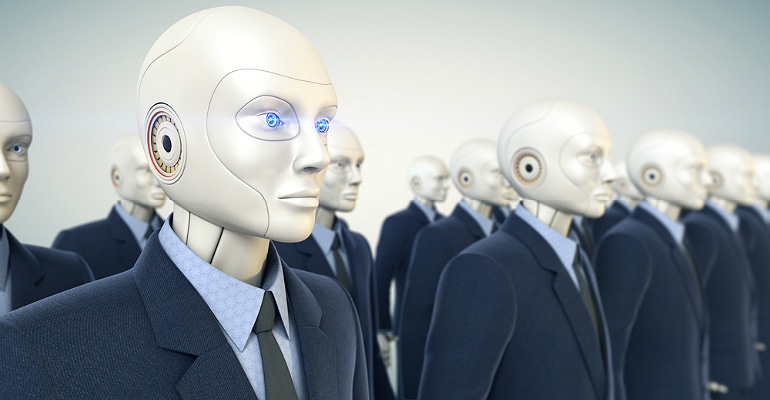A Deloitte principal consultant looks at the future of work and asks the question: Do you have what it takes to adapt?

Just about every worker dreads, at least a little, the coming of artificial intelligence, or AI. We’ve seen the sci-fi movies, heard the scary stories. Earlier this month, Google shocked the tech community with a demo of Google AI Assistant making a haircut appointment for someone over the telephone — and fooling the receptionist into believing she was talking to a real person.
Late last year, McKinsey Global Institute released results of a study predicting some 800 million jobs could be lost to AI and automation by 2030. Even though McKinsey says new jobs will offset these loses, one thing is certain: Swaths of employees will need to adapt dramatically over the next decade.
“We have to take lifelong reinvention seriously as individuals, as business leaders, and from a government and education institution perspective,” says Jeff Schwartz, principal at Deloitte and leader of the future of work practice in the United States. “It is one of the really integrative challenges, as we think about the future of work and how to navigate it together in a positive way.”
Schwartz’s group recently produced a video on what it believes are the seven new realities of work. The research predicts great changes underway, yet maintains a sense of optimism in the unique qualities of human beings, especially their ability to relearn and reinvent themselves.

Jeff Schwartz
Jeff Schwartz
Not everyone is going to make it, of course. It will test your mettle. The better prepared you are, the greater your chances of success. To this end, Channel Futures sat down with Schwartz to learn more about the new realities for the future of work.
Channel Futures: What do you mean by the realities for the future of work?
Jeff Schwartz: Given what’s going on in automation and technology, given what’s happening around different talent models and options – sometimes called the “open talent economy” for everything from full-time employees to freelancers to gig and crowd workers – we should expect in the next five to seven years that we’re going to redesign pretty much everyone’s job in the world. We’re going to be working with technologies and colleagues that we’re not working with today.
It’s a major concern in the business and popular press. Are we heading toward a robot apocalypse? Or are we heading toward the unleashed, untethered workforce in the age of the imagination economy? As in the case of most truths, the future is some version of the unleashed workforce and the imagination economy, and some version of a lot of us [having] to change our jobs because of technology and new talent models.
We have this unique opportunity in the next decade to retrain and develop pretty much everybody who’s working anywhere in the world.
CF: Can you summarize the seven realities in your research?
JS: One is simply the intersection of technology, talent and transformation. The incredibly rapid, exponential growth of automation, cognitive and communication technologies and sensors is changing the way all of us are going to be working.
The second is the rise of the exponential organization, which is much more productive, and in many ways built around data not as a byproduct, but as a way to organize work and produce results. Organizations are really based on platforms and data and create different efficiencies in terms of the way we operate.
The third reality is the unleashed workforce. What we mean by this is people working with machines every day. It’s less about this being the AI economy or robotics economy, and more about this being a people-and-machines economy.
The fourth is something we call lifelong reinvention. The average time on a job is shortening maybe three or four years, and the half-life of a learning domain skill – for example, the value of a computer language or understanding how to repair a thermostat – is getting shorter, from a decade or two to a couple of years. It’s the notion that lifelong reinvention, constant learning and re-learning, creating and adapting to new skills, becomes part of the way we need to be thinking about 21st century careers.
The fifth reality is some combination of ethics of work and society. A big challenge here is recognizing that the impacts of the transitions that we’re seeing around the future of work for individuals are going to be pretty significant, and we probably need transition programs and social programs to reflect that.
The sixth is something we call the nimble enterprise. Really what we’re talking about is that the enterprise operates as much as an ecosystem as an enterprise, meaning we should expect that the biggest growth in employment will be in the ecosystem layer. How we work and manage people who are both freelance workers and full-time workers is center stage.
The last piece is something we noticed in the last year, which is living in a world of regulated innovation. Look at what’s happened to the ride-share drivers at Uber and Lyft and some of the regulatory challenges. Cities and states, even more federal and national entities, are beginning to regulate innovation around new ways of working.
CF: As an older worker, I’m interested in your idea about lifelong reinvention. Is it realistic to expect everyone to reinvent themselves every few years with different skill sets?
JS: As individuals, this is the question that’s grabbing our attention probably more than any other. What does it mean for us to live in a world where technology is changing the nature of work and careers as quickly as we think it might? What advice would you give somebody [who is] 15 or 25 or 55 who’s trying to find a new job?
Part of this goes back to a discussion we had with Tom Friedman last July. Tom reminds us that we all started as lifelong learners. We actually unlearned how to become lifelong learners somewhere along the line. We learned that the once-and-done learning model was sufficient.
There are at least two sides of this learning reinvention question. The first is, what are the skills and attributes we need to be lifelong learners and lifelong workers? Most of those skills are actually not technical or industry-specific skills.
We know that the ability to ask questions, to empathize with different kinds of people, to tell a clear narrative (written or verbal), to solve problems in a structured and deliberate way, are incredibly valuable lifelong skills.
My personal view: In many ways, education has gone off the rails. We’ve substituted the essential skills that we need to be successful learners and workers by trying to very quickly identify a domain of expertise that itself will be enduring. But learning skills are more enduring than knowledge skills.
The toughest situation in the next few years will be people who basically don’t have very good learning skills. It’s an easier discussion for a 5- or 15- or 25-year-old, but it’s a tougher one for a 55-year-old. I’m 59. Can you get into a mode where you can be a learner, be adaptive and pick up new skills?
CF: The elephant in the room is AI taking away jobs. In many cases, AI has the potential to take over entire professions, leaving few or no adjacencies to relearn. Where do you stand on this?
JS: It is one of a few elephants in the room. What happens to our jobs and our livelihood as AI does more and more? Other elephants in the room: Will any of our children work for a company again? Will we all be a global network of freelancers?
Coming back to AI, we’ve been through very significant technology transitions before. One of the reasons this one is different — the speed and scale at which it’s happening is very dramatic. The idea that we need to re-skill the global workforce over the next 10 years is a pretty daunting task. Most companies are trying to figure out how to get started.
I think back to some of the great technology revolutions over the last hundred years. One of them is the Green Revolution in Asia that led to unbelievably large improvements in agricultural productivity. One of the major byproducts of increased productivity was basically starvation went down – we’ve created a global surplus of food – but the number of farmers in every population, including developing countries, plummeted.
As we talk about AI, it’s sort of looking at the Green Revolution from the perspective of all the farmers who were thrown out of work. The challenge in front of us is, as machines can do things people used to do, what are the kinds of things people can uniquely do?
I’ll end with the observation that Tom Friedman put in front of us. He said, if a machine can do it, a machine will do it. As individuals, business leaders and societal leaders, we have to understand the things that people can do and help build the skills and careers in order to do that.
It’s a grand challenge, how we reinvent and develop skills — not on soft skills but enduring, essential skills that people can uniquely do. Things like imagination, composition, experiences are human things. That’s where I think we’re going to expect to see the growth.
About the Author(s)
You May Also Like


